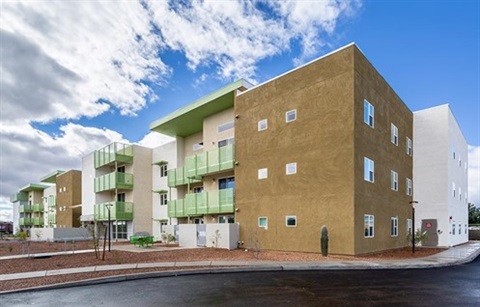Advancing Affordable Housing

Housing affordability has been identified as a high-priority area by the Tucson Mayor and Council. Over the past few years, the City of Tucson has expanded or launched several affordable housing initiatives to support the preservation and construction of housing units.
Housing Affordability Strategy for Tucson
In recent years Tucson has experienced rapid housing costs, maintains comparatively high rates of poverty, and the global COVID-19 pandemic has further exacerbated existing socio-economic disparities. This has led to rising eviction rates, landlords refusing to accept Housing Choice Vouchers and a lack of resources community-wide to meet the demand of affordable housing. Understanding these concerns, the Tucson Mayor and Council directed the Department of Housing and Community Development to develop a comprehensive affordable housing plan. The Housing Affordability Strategy for Tucson (HAST) lays out 10 Policy Initiatives and several specific actions that HCD will take to support the preservation and construction of new housing in Tucson to help meet the demand.
Down Payment Assistance Program
Assistance is available for first time homebuyers purchasing throughout the City of Tucson and Pima County, excluding Tribal lands. Learn more about the program on the Down Payment Assistance Program page.
Housing Market Study
Read the 2024 Housing Needs Assessment
The City of Tucson, Pima County, and University of Arizona’s Economic and Business Research Center through the MAP Dashboard partnered on a regional housing market study to help decision makers better understand the existing housing stock and development trends and to identify gaps and potential policies to support a variety of housing options that meet the needs of the full range of household types in our community. The data from the Housing Market Study was used to inform the Housing Affordability Strategy for Tucson (HAST).
The study included three phases:
- Neighborhood Vulnerability Index to help target resources, policies and programs
- Housing Market Assessment that contains detailed housing data
- Gap Analysis to help estimate existing and future demand
Affordable Housing Impact Fee Study Program
The City of Tucson may provide an impact fee subsidy for eligible affordable housing providers whose residential rental or homeownership development is affordable to households that earn one-hundred (100) percent of the area median income or less and that agree to maintain that affordability for no less than twenty (20 years). The subsidy is subject to Mayor and Council approval and available funding.
Related Documents
Affordable Housing Impact Fee Policy Summary Sheet(PDF, 176KB)
Ordinance 11919 - Impact Fee Subsidy Program(PDF, 1MB)
2024 Maximum Affordable Pricing Schedule(PDF, 478KB)
Impact Fee Subsidy Request Form
Commission on Equitable Housing and Development (CEHD)
The Tucson Mayor and Council established the Commission on Equitable Housing and Development (CEHD) to allow various stakeholders to provide regular input on issues surrounding housing and development.
The CEHD reviews, investigates, and recommends actions to the Mayor and City Council, based on research, data, and inclusive input, to increase housing affordability. Meetings are open to the public and every meeting has a call to the public where interested residents can address the commission and provide input on housing-related issues.
Affordable and Mixed-Income Housing on City-Owned Properties
“Develop Affordable and Mixed-Income Housing on City-Owned Properties” is Policy Initiative 7 of the Housing Affordability Strategy for Tucson. HCD focuses on housing for low-income households. However, there are also several advantages to mixed-income housing. Market rate units help offset the cost of the affordable housing units and increase social diversity. The City’s development arm will utilize city-owned sites to build affordable and mixed-income housing projects.
The City of Tucson is developing a phased development for existing city sites. Currently, there are two projects that HCD is currently working on described below.
Westmoreland Lots in the Menlo Park Neighborhood
Site History
The City of Tucson purchased Westmoreland Lots in 1995 and used the then-existing six residential units for public housing until 2005. These units were demolished in 2006. In 2008, the property was conveyed to a non-profit organization for the development of 11 affordable and three market-rate home ownership units; however, that project never came to fruition and the lot has been vacant since. In 2009, Pima County General Obligation Bonds supported the installation of underground utilities.
Current Project
Given the history of the site as public housing, high demand and low supply of affordable housing units, and the public funding already invested in the infrastructure, the City of Tucson is interested in pursuing affordable housing at the site that is compatible with the history and character of Menlo Park. The intention is to select a co-developer that submits a buildable proposal that meets the primary objectives of the neighborhood.
View map of project sites
Related Documents
Financial Feasibility Analysis from BAE Urban Economics(PDF, 492KB)
Neighborhood Survey Summary(PDF, 318KB)
11th Avenue near Speedway in the Dunbar Spring Neighborhood
Site History
This vacant property on the northwest corner of 11th Avenue and 1st Street in the Dunbar Spring neighborhood is the former site of the Salvation Army Hospitality House, now located adjacent to the west. The zoning review for the relocation of the Hospitality House required an administrative Special Exception review process. Approval of the Special Exception included a condition that the City of Tucson work with the Dunbar Spring neighborhood to develop affordable and/or market-rate housing on the site. A neighborhood association subcommittee focused exclusively on developing design guidelines to help guide the development of the site.
Current Project
Given the site’s history and the City’s commitment to construct affordable housing there, the City of Tucson is interested in pursuing affordable housing that is compatible with the history and character of Dunbar Spring. The intention is to select a co-developer that submits a buildable proposal that meets the primary design guidelines identified by the neighborhood.
View map of project sites
Related Documents
Financial Feasibility Analysis from BAE Urban Economics(PDF, 492KB)
Dunbar Spring Design Guidelines(PDF, 104KB)